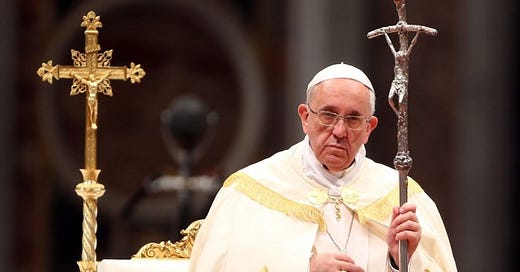Is Roman Catholic or Eastern Orthodox Worship Authentic or Idolatrous?
God's Regulation of Worship
And his mother said, “Blessed be my son by the Lord.” And he restored the 1,100 pieces of silver to his mother. And his mother said, “I dedicate the silver to the Lord from my hand for my son, to make a carved image and a metal image. Now therefore I will restore it to you.” So when he restored the money to his mother, his mother took 200 pieces of silver and gave it to the silversmith, who made it into a carved image and a metal image. And it was in the house of Micah.
This passage in the Old Testament comes right after the story of Samson in the book of Judges. During this time in history, the law of God was already long transcribed by the hands of Moses. The Lord makes it very clear that he forbids the worship of idols:
You shall not make for yourself a carved image, or any likeness of anything that is in heaven above, or that is in the earth beneath, or that is in the water under the earth. You shall not bow down to them or serve them, for I the Lord your God am a jealous God, visiting the iniquity of the fathers on the children to the third and the fourth generation of those who hate me, but showing steadfast love to thousands of those who love me and keep my commandments.
Humanity's Rebellion Against God's Regulations
Rather than obey the law of God, Micah’s Mother displayed her idolatrous heart. Dissatisfied with the prescribed means of worship provided by God’s law she had an idol crafted for herself. Yet even in the midst of her carnal devotion to idols, she tries to maintain a sense of piety. She dedicates her idol the Lord. This arrogant woman thought she could honor God with her own made up religious inventions despite God’s clear commandment that graven images were forbidden.
See also: Why We Draw the Line at Justification.
This scene in Scripture reminds me of Roman Catholic statues and the icons of the Eastern Orthodox Church. It reminds me of how Roman Catholic Priests hold their crucifix and how the Greek Orthodox kiss the faces of dead martyrs. The common ground between Micah’s mother and the Papist is the false piety of their idolatry. Micah’s mother believed that because she dedicated her idol to the Lord that it made her wicked deeds lawful. These wicked ideas are clearly passed down to her apostate son who gets himself a Levitical priest to offer sacrifices to this idol (Judges 17:13).
How This Principle Applies to Modern Worship
This way of thinking is delusional. God expects worship in the manner He has commanded. It is not for us to invent ways of worship in contrast to how He has commanded. God’s word is the lamp to our feet and the light to our path (Psalm 119:105). 2 Timothy 3:16-17 says, “All Scripture is breathed out by God and profitable for teaching, for reproof, for correction, and for training in righteousness, that the man of God may be complete, equipped for every good work.”
Question: Is proper worship a good work?
Answer: Yes as the Scripture says:
Oh give thanks to the Lord; call upon his name;
make known his deeds among the peoples!
Sing to him, sing praises to him;
tell of all his wondrous works!
Glory in his holy name;
let the hearts of those who seek the Lord rejoice!1 Chronicles 16:8-10
The Scriptures are sufficient to equip the godly in every good work (2 Tim 3:17) and worship, indeed, is a good work. Therefore, Scripture must be our standard in the good work of worship. We ought to lay aside all of our lofty opinions of how to worship God and submit to the guidance of His Word.
Coram Deo Thought
Are there any idols that you have crafted and dedicated to God? Any weight in life that you declare with your mouth is a means to praise God when in reality it is a means for your own self-exaltation? I remember when I used to exercise I swore I was doing it for God’s Kingdom when in reality I was pursuing my own goals of vain praise.
Examine your life. If there be any idols dedicated to Christ, smash them as King Josiah smashed the idols of his day into powder. Repent and ask God with the psalmist, “And see if there be any grievous way in me, and lead me in the way everlasting!” (Psalm 139:24)





